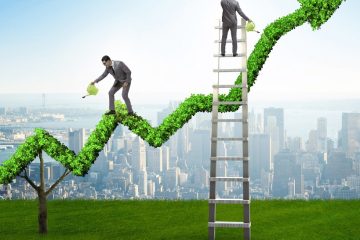How to Cultivate an Entrepreneurial Mindset for Sustainable Growth

In an era where the landscape of business is constantly evolving, success is no longer determined solely by financial metrics or market share. The true differentiator for thriving in the long term is the ability to adopt an entrepreneurial mindset. This mindset—one that emphasizes innovation, resilience, and strategic foresight—has become a fundamental ingredient for achieving sustainable growth in an increasingly competitive world.
An entrepreneurial mindset is not confined to startups or small businesses. In fact, its value extends across all levels of an organization, from budding enterprises to large-scale corporations. So, what does it mean to cultivate such a mindset, and how can it be leveraged to foster sustainable growth? This article will explore key strategies for developing an entrepreneurial mindset and outline how it can serve as a driver of continuous progress in any business environment.
1. Embrace a Growth-Oriented Perspective
One of the cornerstones of an entrepreneurial mindset is a growth-oriented perspective. Entrepreneurs see opportunities where others might see obstacles. They approach challenges as learning experiences and remain open to adapting their strategies in response to changing circumstances. This mindset is crucial for long-term success because it allows individuals and organizations to remain agile, pivot when necessary, and learn from both failures and successes.
For businesses aiming for sustainable growth, fostering a culture of continuous learning is paramount. This involves encouraging employees at all levels to take initiative, experiment, and take calculated risks without the fear of failure. Companies should invest in training programs that promote innovative thinking, collaboration, and adaptability. By nurturing this mindset, businesses can ensure that they remain relevant and capable of seizing emerging opportunities.
2. Innovation as a Habit, Not a Trend
An entrepreneurial mindset thrives on innovation, but not just in bursts of inspiration. True innovators integrate creativity and problem-solving into their daily work routines. Sustainable growth is underpinned by the ability to constantly evolve, whether through the refinement of existing products, the introduction of new services, or the improvement of operational efficiencies.
In practice, this means that businesses must establish a culture where innovation is not relegated to a specific department or innovation “lab,” but becomes part of the company’s DNA. Leaders should encourage employees to question the status quo and explore unconventional solutions to traditional problems. The process of continuous innovation should be seen not as a singular event but as an ongoing practice of improvement and iteration.
To facilitate this, businesses can adopt a flexible approach to idea generation, where failure is seen as a stepping stone rather than a setback. Regular brainstorming sessions, cross-departmental collaborations, and “fail-fast” methodologies can foster an environment where innovation flourishes, ultimately leading to sustainable growth.
3. Resilience: Bouncing Back from Setbacks
The road to entrepreneurial success is rarely linear. Setbacks, disappointments, and failures are inevitable. However, what separates successful entrepreneurs from others is their ability to bounce back from these challenges. Resilience—the capacity to recover quickly from difficulties—is essential for businesses seeking long-term sustainability.
An entrepreneurial mindset encourages individuals and organizations to view failure as a temporary setback rather than a permanent defeat. Rather than being paralyzed by mistakes, resilient leaders use them as opportunities for reflection and improvement. This mindset shift fosters an environment where employees are empowered to take calculated risks without the fear of catastrophic consequences, which in turn drives innovation and growth.
Moreover, resilience extends beyond individual setbacks to challenges posed by the market, competition, and external factors. Businesses must learn to pivot, diversify their offerings, and find new paths forward when faced with disruptions. A resilient entrepreneurial mindset equips companies with the agility to adapt and thrive even in the face of uncertainty.
4. Customer-Centric Thinking
An entrepreneurial mindset also involves an intense focus on understanding and serving customers. Sustainable growth is driven by businesses that prioritize customer needs and consistently deliver value. Entrepreneurial leaders instinctively put the customer at the center of every business decision, constantly gathering feedback and adjusting their products, services, and processes to better meet market demands.
This approach requires businesses to move beyond surface-level customer satisfaction and engage in deeper relationships with their audiences. Regularly soliciting feedback, monitoring customer trends, and anticipating future needs can provide invaluable insights that fuel innovation and guide long-term strategic planning. By nurturing loyalty and trust through exceptional customer service and value, companies can ensure that their growth is not only sustainable but also customer-driven.
A practical way to implement customer-centric thinking is by adopting a more personalized approach to marketing and communication. Using data analytics, businesses can segment their customer base and tailor their offerings to different audience segments, enhancing the relevance of their products and services.
5. Long-Term Vision with Strategic Execution
Entrepreneurial thinkers are not short-sighted. They have a vision for where they want to take their business in the long run and are willing to make decisions today that may not pay off immediately but will lead to sustainable growth down the road. This long-term vision is often what separates successful entrepreneurs from those chasing quick wins.
The entrepreneurial mindset involves balancing ambition with strategic execution. While vision provides direction, execution is what turns ideas into reality. Successful entrepreneurs are disciplined in their approach, making incremental progress toward their long-term goals. They don’t get distracted by fleeting trends or immediate rewards but remain focused on building value over time.
To foster sustainable growth, businesses must develop a clear roadmap that outlines their long-term objectives, key milestones, and the steps needed to achieve them. This strategy should be regularly reviewed and adjusted in response to changing circumstances, but the core vision must remain intact.
6. Cultivating a Network of Support
No entrepreneur thrives in isolation. One of the most powerful aspects of the entrepreneurial mindset is its emphasis on building relationships and leveraging networks of support. Sustainable growth often comes not from individual effort but from collaboration, partnerships, and the collective wisdom of a strong network.
Entrepreneurs who understand the value of networking seek out mentors, advisors, and strategic partners who can provide guidance, insights, and resources. These relationships open doors to new opportunities, help navigate challenges, and offer diverse perspectives that drive innovation and business development.
In the context of sustainable growth, businesses should also look to cultivate strong relationships with other organizations, suppliers, and even competitors. Collaborative efforts, such as joint ventures or co-branding initiatives, can expand market reach and open up new revenue streams.
Conclusion
Cultivating an entrepreneurial mindset is a key factor in achieving sustainable growth. By adopting a growth-oriented perspective, embracing innovation, building resilience, focusing on customer needs, executing with long-term vision, and nurturing a strong network of support, businesses can position themselves for success in the face of constant change and challenge. Ultimately, the entrepreneurial mindset is not just about achieving short-term wins; it’s about creating a foundation for lasting impact and enduring prosperity.
For businesses that manage to harness the power of this mindset, the road to sustainable growth is not just a possibility—it becomes an inevitability.








